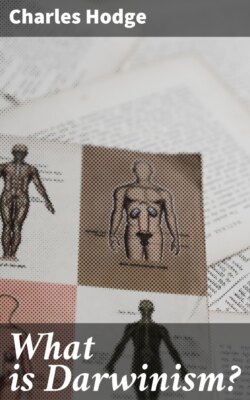Читать книгу What is Darwinism? - Charles Russell Hodge - Страница 11
На сайте Литреса книга снята с продажи.
Theism in Unscriptural Forms.
ОглавлениеTable of Contents
There are men who are constrained to admit the being of God, who depart from the Scriptural doctrine as to his relation to the world. According to some, God created matter and endowed it with certain properties, and then left it to itself to work out, without any interference or control on his part, all possible results. According to others, He created not only matter, but life, or living germs, one or more, from which without any divine intervention all living organisms have been developed. Others, again, refer not only matter and life, but mind also to the act of the Creator; but with creation his agency ceases. He has no more to do with the world, than a ship-builder has with the ship he has constructed, when it is launched and far off upon the ocean. According to all these views a creator is a mere Deus ex machina, an assumption to account for the origin of the universe.
Another general view of God's relation to the world goes to the opposite extreme. Instead of God doing nothing, He does everything. Second causes have no efficiency. The laws of nature are said to be the uniform modes of divine operation. Gravitation does not flow from the nature of matter, but is a mode of God's uniform efficiency. What are called chemical affinities are not due to anything in different kinds of matter, but God always acts in one way in connection with an acid, and in another way in connection with an alkali. If a man places a particle of salt or sugar on his tongue, the sensation which he experiences is not to be referred to the salt or sugar, but to God's agency. When this theory is extended, as it generally is by its advocates, from the external to the internal world, the universe of matter and mind, with all their phenomena, is a constant effect of the omnipresent activity of God. The minds of some men, as remarked above, are so constituted that they can pass from the theory that God does nothing, to the doctrine that He does everything, without seeing the difference. Mr. Russel Wallace, the companion and peer of Mr. Darwin, devotes a large part of his book on "Natural Selection," to prove that the organs of plants and animals are formed by blind physical causes. Toward the close of the volume he teaches that there are no such causes. He asks the question, What is Matter? and answers, Nothing. We know, he says, nothing but force; and as the only force of which we have any immediate knowledge is mind-force, the inference is "that the whole universe is not merely dependent on, but actually is, the will of higher intelligences, or of one Supreme Intelligence."[5] This is a transition from virtual materialism to idealistic pantheism. The effect of this admission on the part of Mr. Wallace on the theory of natural selection, is what an explosion of its boiler would be to a steamer in mid-ocean, which should blow out its deck, sides, and bottom. Nothing would remain above water.
The Duke of Argyll seems at times inclined to lapse into the same doctrine. "Science," he says, "in the modern doctrine of conservation of energy and the convertibility of forces, is already getting a firm hold of the idea, that all kinds of force are but forms of manifestations of one central force issuing from some one fountain-head of power. Sir John Herschel has not hesitated to say, 'that it is but reasonable to regard the force of gravitation as the direct or indirect result of a consciousness or will existing somewhere.' And even if we cannot certainly identify force in all its forms with the direct energies of the one Omnipresent and All-pervading Will, it is at least in the highest degree unphilosophical to assert the contrary—to think or to speak, as if the forces of nature were either independent of, or even separate from the Creator's power."[6] The Duke, however, in the general tenor of his book, does not differ from the common doctrine, except in one point. He does not deny the efficiency of physical causes, or resolve them all into the efficiency of God; but he teaches that God, in this world at least, never acts except through those causes. He applies this doctrine even to miracles, which he regards as effects produced by second causes of which we are ignorant, that is, by some higher law of nature. The Scriptures, however, teach that God is not thus bound; that He operates through second causes, with them, or without them, as He sees fit. It is a purely arbitrary assumption, that when Christ raised the dead, healed the lepers, or gave sight to the blind, any second cause intervened between the effect and the efficiency of his will. What physical law, or uniformly acting force, operated to make the axe float at the command of the prophet? or, in that greatest of all miracles, the original creation of the world.
